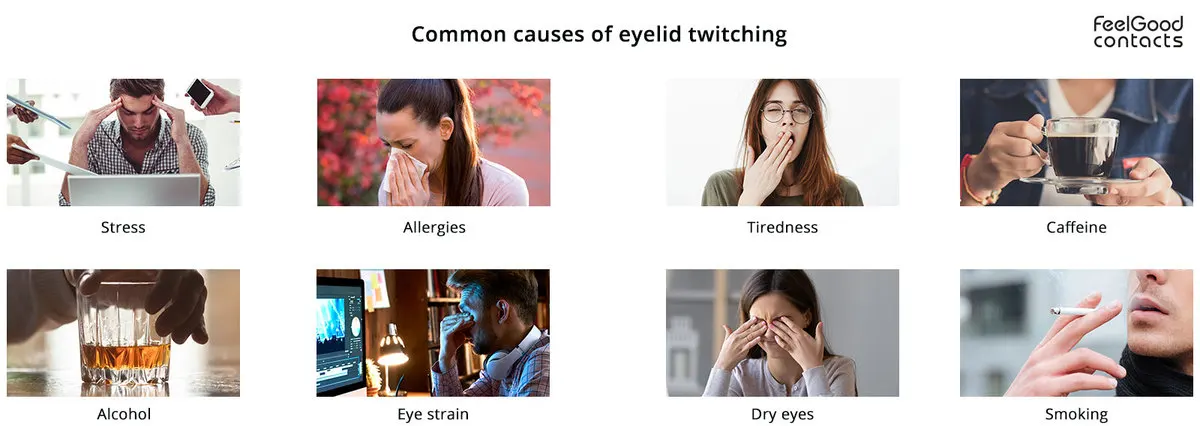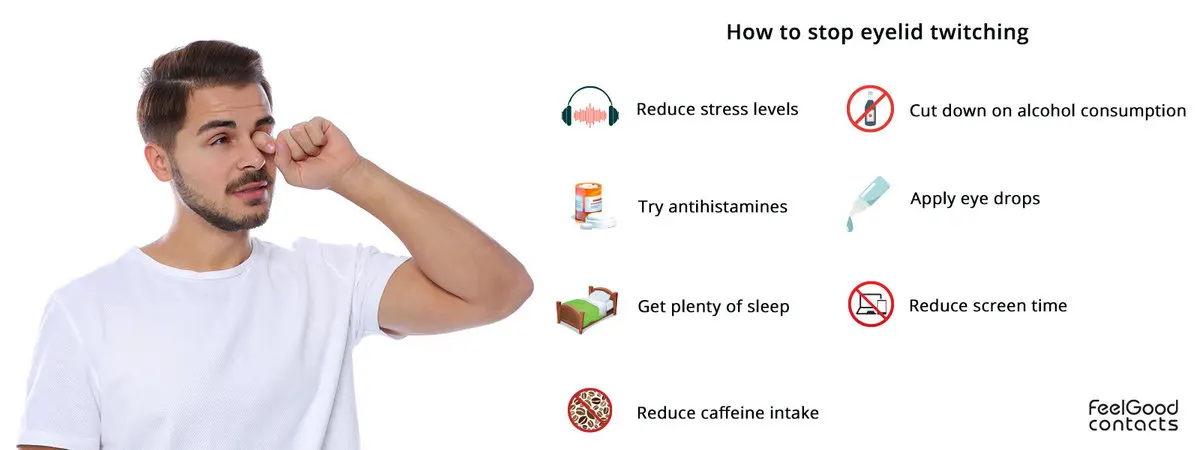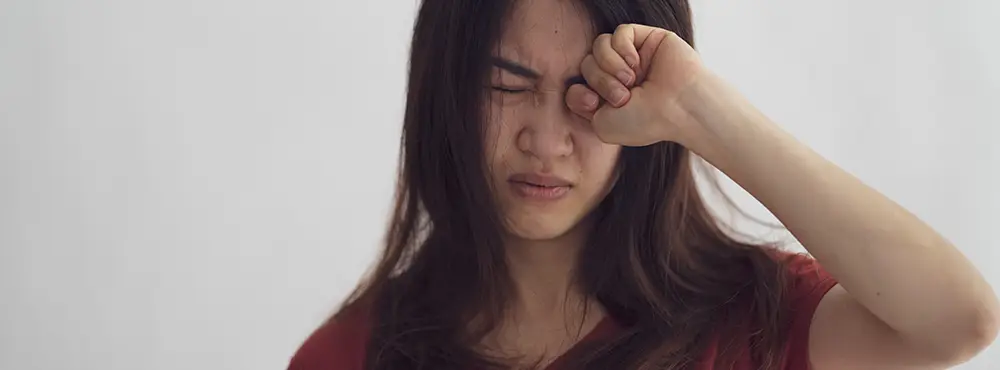Eye twitching and spasms are very common and, thankfully, rarely tend to be a result of something serious. Although they may not be painful, it doesn’t mean that twitching eyelids can’t be very annoying and uncomfortable to live with.
Typically, it’s just the lower eyelid that twitches, however in some cases the upper lid or both of them can twitch.
What causes eyelid twitches?

Eye twitching can be caused by a range of lifestyle factors including:
- Stress
- Allergies
- Tiredness
- Caffeine
- Alcohol
- Eye strain
- Dry eyes
- Smoking
- Certain medications
These are a few of the more common causes of eye twitching. However, there are some more serious causes of eye twitching too. If eye twitching becomes a concern, it is advised that you contact your GP.
Types of eyelid twitches
There are 3 main types of eyelid twitches: general eyelid spasm, benign essential blepharospasm and hemifacial spasm.
1. General eyelid spasm
This refers to eyelid twitches which happen quickly or a little and don’t affect your vision. They are fairly normal and not an indicator of anything serious. General eyelid spasms are often caused by a variety of environmental factors including stress and being tired. Most eyelid twitches go away with rest and do not require treatment. Other ways to reduce eyelid twitching is by reducing stress and limiting your caffeine intake.
2. Benign essential blepharospasm
This is the name given to uncontrollable and chronic twitching. This condition occurs more often in men than in women and can affect one or both eyes causing them to close involuntarily. They are caused by a nerve impulse, although doctors are not sure why it happens.
Benign essential blepharospasms can last for a few seconds or a few hours. In some cases, the spasms are severe, causing the eyelids to stay shut for several hours. They can also lead to blurry vision and increased sensitivity to light.
Botulinum toxic injections are the best way to treat benign essential blepharospasms.
3. Hemifacial spasm
A hemifacial spasm is an eyelid twitch affecting just one eye. It is very rare and involves the muscles around your mouth and eyelid. It is usually caused by an artery putting too much pressure on one of your facial nerves. It is more common in women then in men and can lead to all the muscles on one side of your face twitching, the inability to open one eye and uncontrollable eye twitching, if not treated. A hemifacial spasm can affect eating and speaking and is much more severe than other types of twitches.
How long can an eye twitch last?
An eye twitch can last anywhere between a few days or weeks. It shouldn't last more than a few weeks and if it does, you should consult your optician or GP immediately.
When should I be worried about eye twitching?
Eye twitching may also be something to worry about if you experience any of the following:
- Red or swollen eyes
- Your eyelid closing completely every time it twitches. If you're experiencing eyelid spasms strong enough to close both eyelids, this could be a condition known as blepharospasm
- You find it hard to open your eye
- The twitching lasts longer than a few weeks
- You have twitching on your face and or elsewhere on your body
- Your eyes are looking droopy
- Feeling lightheaded
- A decrease in the quality of your vision
Is eye twitching a sign of something serious?
Although rare, twitching eyelids can be an early sign of certain brain and nervous system disorders. These can include:
- Parkinson’s disease
- Bell's palsy
- Cervical dystonia
- Dystonia
- Multiple sclerosis
- Tourette syndrome
- Oromandibular dystonia and facial dystonia
Certain drugs, particularly medication used for treating Parkinson's disease can cause side effects which include eye twitching. However, in some cases, eye twitching can also be an early sign of a chronic movement disorder which is usually accompanied by other facial spasms.
When do eyelid twitches require a visit to the doctor?
Eyelid twitches don't usually require a visit to the doctor unless chronic. Chronic eyelid twitching can indicate a more serious issue such as a brain or nervous system disorder.
You should seek medical advice if you experience chronic eyelid muscles spasms accompanied by any of the following symptoms:
- A red or swollen eye
- Unusual discharge from the eye
- A drooping upper eyelid
- The twitching lasts for several weeks
- Other parts of your face are being affected
- Every time your eyelids twitch the eyelid closes completely
How do you stop a twitching eye?

If your eye twitching is the result of one of the following causes, it’s advisable to follow the steps we’ve laid out for treating the issue.
Stress
Eye twitching can sometimes be the result of too much stress. There are plenty of ways you can bring down your stress levels, such as breathing exercises, short walks and enjoying more relaxation time.
Allergies
Eye allergies release histamine into the eyes, which leads to swelling, irritation, itchiness and sometimes twitching. Most allergies are caused by agents such as pollen and dust. However, a new cleaning product such as contact lens solution or makeup remover in your regime can often be the case behind an eye allergy, and eye twitching as a result. We suggest removing any new products from your regime and to visit your GP.
In the case of allergies caused by dust or pollen, your doctor may be able to prescribe some antihistamine eye drops to relieve the symptoms.
Tiredness
A lack of sleep often leads to twitchy eyes, amongst a number of other symptoms. If you’ve been burning the candle at both ends, just try to catch up on some sleep and you should see your eye twitching disappear.
Caffeine
Unfortunately, caffeine often triggers the eye twitching. A way around this is to cut back on how much caffeine you’re consuming to see if it has a positive effect on your eyes.
Alcohol
Excessive alcohol intake has been known to cause eyes to twitch. That’s why it’s always advisable to drink responsibly, and to limit your alcohol intake in order to stop your eyes from twitching and spasming.
Eye strain
Eye strain can occur if you’re overworking your eyes. Focusing your eyes in poor light conditions and extensive digital screen use can trigger pain, sensitivity to light, dry eye and even eye twitching.
Ways to reduce eye strain include gentle eye massages, practising blinking during screen use and following the 20-20-20 rule which suggests looking away from your screen every twenty minutes at an object 20 feet away for 20 seconds. We also suggest visiting your optician to see if your prescription may have changed.
Dry eyes
Dry eyes offer a number of uncomfortable symptoms, such as red eyes, grittiness, irritation and sometimes twitching. Applying some eye drops to your eyes can help restore the moisture by producing artificial tears; this can help with twitching.
Botox to stop eye twitching
There are rare cases when eyelid twitches can be persistent and won't go away. In this instance Botox injections can be used to treat the involuntary contractions in the eyelid.
However, whilst Botox can be used to relieve spasms for several months, the effects eventually wear off and a top up of injections is usually required.
Quick links:
How to get rid of tired eyes
Computer eye strain: Symptoms and solutions
Does drinking coffee damage your vision?
Disclaimer: The advice in this article is for informational purposes only and does not replace medical care or an in-person check-up. Please check with an eyecare professional before purchasing any products or remedies. For information on our article review process, please refer to our Editorial Policy.

 Offers
Offers Account
Account
 Favorite
Favorite
 Basket
Basket

 OFFERS
OFFERS


















